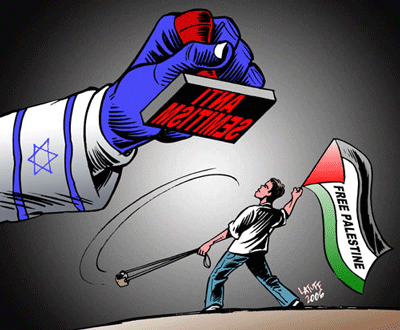Topic Presentation
Introduction
‘Israel’, ‘Palestine’, ‘Gaza Strip’ etc are few of the names that have long been in news and each one of us has heard about them at some point of time. Considering the present situation, it seems that we would keep hearing about these two nations for years to come and just hope that the situation does not get worse from here on. What is it exactly that has gripped the region for so long? What is the historical background for this prolonger conflict? Which of the warring sides is correct? What, if there is any, is the solution to the conflict? We’ll discuss it all of the above in this little attempt of ours to understand of the trickiest issues to occupy the mind-space of modern man for so long.
Summary:
It is imperative for us to give a brief summary of the conflict before a delve in to a detailed discussion of the present. It is not a single war that defines this conflict. It goes back almost 3000 years ago or even more if some accounts are to be believed.
In short, what happened was that the Palestines (read Arabs) were living in Palestine when Jewish people started to settle on the land. Initially this migration was acceptable but as the Jewish population grew , the claim to Palestinian land by both the Jews and the Arabs created problems. This is what the war is all about. The Jews after many years of settlement in the Palestinian land formed an independent state of Israel.
Geography:
The land variously called Israel and Palestine is a small, (10,000 square miles at present) land at the eastern end of the Mediterranean Sea. During its long history, its area, population and ownership varied greatly. The present state of Israel occupies all the land from the Jordan river to the Mediterranean ocean, bounded by Egypt in the south, Lebanon in the north, and Jordan in the East. The recognized borders of Israel constitute about 78% of the land. The remainder is divided between land occupied by Israel since the 1967 6-day war and the autonomous regions under the control of the Palestinian autonomy. The Gaza strip, a name that we have all heard in relation to the ongoing conflict occupies an additional 141 square miles south of Israel, and is under the control of the Palestinian authority.
Ancient and Medieval History
The region is one of the oldest inhabited regions in the world and consequently has a pretty vivid history starting right from the 1800 BC when it is believed that certain Semitic tribes inhabited the region. Many centuries later, after many invasions and conquests Jews people came to settle in the area permanently and formed what is today Israel. Though we must understand that this was not always so. Many a time in history the land has remained with non-Jewish people like the Assyrians, the Babylonians, Persians etc.
It was in about 61 B.C., Roman troops under Pompei invaded Judea and sacked Jerusalem in support of King Herod. The Jewish revolts for freedom were put down during the existence of the Roman Empire, but still the Jews were not wiped out completely and continued to exist in a small area. Also notable is the fact that it was during this time that the region was termed Palestine, a derivative of the term ‘Philistine Syria’. The Romasn would rule till the 3rd Century AD. During the seventh century (A.D. 600’s), Muslim Arab armies moved north from Arabia to conquer most of the Middle East, including Palestine. The rulers allowed Christians and Jews to keep their religions. However, most of the local population gradually accepted Islam and the Arab-Islamic culture of their rulers. Jerusalem (Al-Quds) became holy to Muslims as the site where, according to tradition, Muhammad ascended to heaven after a miraculous overnight ride from Mecca on his horse Al-Buraq. The al-Aqsa mosque was built on the site generally regarded as the area of the Jewish temples
For some time is the region’s history the Christian Crusaders too invaded and occupied the region but they were soon defeated by the Muslims. All this was around the 13th Century AD.
The Ottoman Empire defeated the ruling dynasty of Palestine in 1517, and Palestine became part of the Ottoman Empire. The Turkish Sultan invited Jews fleeing the Spanish Catholic inquisition to settle in the Turkish empire, including several cities in Palestine. At about 1880s, the Ottoman government imposed severe restrictions on Jewish immigration and land purchase, and also began actively soliciting inviting Muslims from other parts of the Ottoman empire to settle in Palestine. The restrictions were evaded in various ways by Jews seeking to colonize Palestine, chiefly by bribery.
Thus we see that it is indeed correct for both the parties involved in the conflict to quote history as an authentic evidence to prove their provenance in the region.
The Rise of Zionism
Zionism basically is a form of nationalism of Jews and Jewish culture that supports a Jewish nation state in territory defined as the Land of Israel. Jews had never stopped coming to “the Holy land” or Palestine in small numbers. Palestine also remained the center of Jewish worship and a part of Jewish culture.
In the nineteenth century the emancipation of European Jews, signaled by the French revolution, brought Jews out of the Ghetto and into the modern world, exposing them to modern ideas. The liberal concepts introduced by emancipation and modern nationalist ideas were blended with traditional Jewish ideas about Israel and Zion. The first Zionist writings were published in the 1840s. Emancipation of Jews triggered a new type of virulent anti-Jewish political and social movement in Europe, particularly in Germany and Eastern Europe. Beginning in the late 1800’s, oppression of Jews in Eastern Europe stimulated emigration of Jews to Palestine. The Zionist movement became a formal organization in 1897.
World War 1
During World War I (1914-1918), the Ottoman Empire joined Germany and Austria-Hungary against the Allies. An Ottoman military government ruled Palestine. The war was hard on both Jewish and Arab populations. For a time, the Turkish military governor ordered internment and deportation of all foreign nationals. Therefore, a large number of Jews were forced to flee Palestine during the war. A small underground group was founded that fed intelligence information to the British, in order to free the land of Turkish rule. Though the group was disbanded, the information it supplied to the British is said to have significantly helped the British Invasion.
Britain and France planned to divide the Ottoman holdings in the Middle East among themselves after the war. . In 1916, Arabs led by T.E. Lawrence (the famous Lawrence of Arabia) revolted against the Ottomans in the belief that Britain would help establish Arab independence in the Middle East. The Arabs claimed that Palestine was included in the area promised to them, but the British denied this.
The British Mandate for Palestine
In November 1917, before Britain had conquered Jerusalem and the area to be known as Palestine, Britain issued the Balfour Declaration. The declaration stated Britain’s support for the creation of a Jewish national home in Palestine, without violating the civil and religious rights of the existing non-Jewish communities. The declaration was the result of lobbying by the small British Zionist movement, but it was motivated by British strategic considerations.
At the Paris peace conference in 1919, Zionist and Arab representatives pleaded their case, and met each other. The Zionists presented a map of the area they wanted for the Jewish national home. Remarkably representatives from both the parties reached a signed agreement regarding Arab support for a Jewish national home. However, the Arab representative conditioned his support on satisfaction of Arab aspirations in Syria. Instead, Syria was given to the French as a League of Nations mandate and he not only withdrew his support from the Zionist project, but claimed he had never signed any such documents.
By this time, Zionists had recognized the inevitability of conflict with the Palestinian and other Arabs.
Independence and Partition
As years went by Jewish immigration into Palestine grew exponentially owing to various reasons, chief among them being the spread of Nazism and the resulting atrocities on Jews. This intensified the situation and increased the Arab resentment of the Jews. The partition of the area into a separate Arab state and a Jewish one was the only remaining option, something that would curtail the growing number of casualties. Before the partition something called the War of Independence broke out with extensive fighting between the Jews and the Arabs of Palestine. On May 14, 1948, the Jews proclaimed the independent State of Israel, and the British withdrew from Palestine. As the fighting ensued Arab states outside of Palestine like Syria, Egypt and Jordan too entered the war. The fighting was conducted in several brief periods, punctuated by cease fire agreements. Despite initial setbacks, better organization and intelligence successes, as well as timely clandestine arms shipments, enabled the Jews to gain a decisive victory.
After the War
A peace treaty was signed between the warring sides with the intervention of the United Nations and it sought to finalize the areas for both Arabs and the Jews. However the Arabs continued to reject the existence of Israel. The USSR, initially in favor of the Zionist state, now aligned itself with the Arab countries. Despite continued US support for the existence of Israel, US aid to Israel was minimal and did not include military aid during the Truman and Eisenhower administrations. Yaseer Arafat, an Egyptian Palestine created the Palestinian Liberation Committee that would later be called the Fatah to defeat Israel and claim the Palestinian land for the Arabs.
Conclusion
We would end the history of the Israel-Palestine conflict on a rather abrupt note simply because it is too vast and complex to be documented in its entirety at such a platform and moreover the basis for the conflict now sufficiently clear. The war between the two sides has continued over the years with the Arabs still refusing to acknowledge the existence of Israel. Fighting has ensued over the years, though intermittently not only because of the land issues but also because of a host of other issues as well like the Suez Canal crisis, Lebanon War etc. Please look up the following resources on the issue to study take it up further:
1. http://www.guardian.co.uk/world/palestinian-territories
2. http://www.guardian.co.uk/world/israel
The two links above will bring you up to speed with all the latest developments on the issue.








